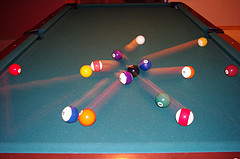
flickr.com/demaiob
Billiards is an age-old game and to some, a serious game. While your idea of fun might involve a casual game of eight ball or snooker, you should also possess a general knowledge of the grand old game of billiards.
The rules of billiards are quite fundamental, and not too unlike the barroom sport you’re more inclined to play.
* In billiards, all of the billiards balls within the racking triangle must be touching. If you take the break shot, hit the cue ball with your cue stick to initiate play of the game. Anything other than a straight strike of the cue ball can result in your disqualification.
* In regulation billiards, it is vital to call every shot. If you are playing under these rules, you must call the shot out loud before the stroke of the cue stick, indicating the ball you are shooting for and the pocket or combination you are trying to hit. If you do not pocket your shot, your turn comes to a finish. However, any extra balls that are pocketed are credited to you.
* A billiards ball is only considered pocketed when it falls into the pocket and remains there. This involves balls that may fall through the pocket onto the floor. If the billiards ball bounces out of the pocket and return onto the table, it is not considered pocketed and the ball is still in play.
* Each of your shots must be made with both feet set securely on the ground. Any billiards shot that you make with one foot raised off the ground, even a little, is cause for disqualification.
* You can also be disqualified from the billiards game, as the shooter, if you make a shot while one or more balls are still in motion. Billiards players must wait for all of the balls to come to an absolute stop before taking the next shot.
* At any time, if the cue ball is pocketed on a shot, that player’s chance is over.
 |
Proven Techniques That Are Guaranteed to Turn Good Players Into Great |
* If a billiards ball jumps off of the playing area as a result of a shot, that shot is considered foul. The ball can jump, but not leave the playing surface (floor or rail) without penalty. If your ball lands on the floor or rail, it is considered foul and must be changed after all other billiards balls from the shot have stopped moving.
You never know when a new opponent might dare you to a game of billiards. If you know the rules, you’ll be prepared to join in the fun. Besides, having an understanding of proper billiards might just help you to become a better snooker or pool player.
Tagged with: billiards game • billiards tournament
Filed under: Billiards